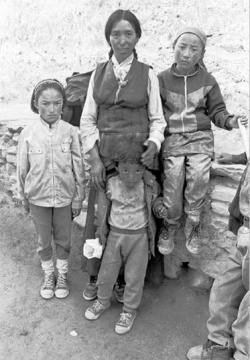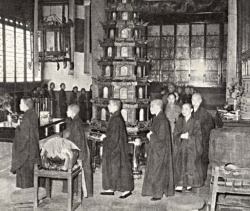The Five Root Vows and Monastic Vows: notes from a discussion with Gyumed Khensur Rinpoche Losang Jampa
I spoke with Khensur Rinpoche briefly about the five root vows and monastic vows.
Entering the Buddhist path involves taking Refuge in the Buddha, Dharma, and sangha and taking vows to help us guard ourselves from non-virtuous actions.
Five Root Vows (ge nyen, Tib)
The five root vows are the foundation for the monastic vows.
The five root vows are:
1.) Not killing human beings,
2.) Not stealing,
3.) Not lying,
4.) Not committing sexual misconduct (adultery),
5.) Not becoming intoxicated (drugs, alcohol).
The lay vows involve taking the five root vows.
“Killing” refers to any sentient being. Killing as a root downfall — meaning that when committed one loses one’s vow (phamba, Tib), refers to killing human beings.
“Stealing” is culture-specific as different societies value different things.
Transgressing the root vow would be to steal an object that is valued by society so that you end up in trouble with the law.
“Lying” is defined as pretending to have realized emptiness, omniscience etc.
In general, lying refers to any verbal or non-verbal expression one with the intention of deceiving others.
So it also refers to making factual statements with the intention to deceive others.
The supreme ge nyen vow is the same as the five root vows with the exception being that instead of sexual misconduct, one takes the vow of celibacy.
Having taken the supreme ge nyen vow, one can also wears robes.
The five root vows are taken in the presence of a spiritual elder.
Renunciate vows (rab jung, Tib)
By taking the rab jung vows, a person commits to:
1.) leave behind lay clothes and signs,
2.) wear the robes of an ordained person and shave one’s head,
3.) follow the Buddha’s teachings.
The combination of the five root vows and rab jung vows is the first step to ordination.
After taking these vows, one can then take the vows of a novice nun (getsulma) or monk (getsul).
For nuns, this is an additional ten vows. 253 additional vows are taken for becoming a fully ordained monk (gelong). As far as I can tell, while His Holiness expressed support for full ordination for nuns in 2007, this has yet to be implemented.
New IMI Policy
The International Mahayana Institute released new ordination guidelines this week.
They clearly state that anyone who ordains must not work unless it’s for a Dharma center.
Unless you can stop working, you can not take even the rab jung vows because novices wear robes.
Although currently there are many monks and nuns in the West who work, the new policy was developed by Lama Zopa Rinpoche and the Office of His Holiness the Dalai Lama as being in the best interest of protecting the sangha and Buddha Dharma in the West.
For more information, please see the link below.
Opportunity to Take the Five Root Vows
If you’d like to take the five root vows, there’s no better time than on June 18 when we will be celebrating Buddha’s Birth and Enlightenment.
Gyumed Khensur Rinpoche will be leading us as we take the Eight Mahayana Precepts.
The Precepts center around the five root vows which you commit to take for as long as you think you can realistically maintain them.



